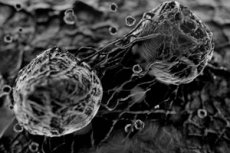Nye publikasjoner
Det er identifisert et bredt utvalg av gener som er involvert i aldersrelaterte blodcellemutasjoner
Sist anmeldt: 02.07.2025

Alt iLive-innhold blir gjennomgått med medisin eller faktisk kontrollert for å sikre så mye faktuell nøyaktighet som mulig.
Vi har strenge retningslinjer for innkjøp og kun kobling til anerkjente medieområder, akademiske forskningsinstitusjoner og, når det er mulig, medisinsk peer-evaluerte studier. Merk at tallene i parenteser ([1], [2], etc.) er klikkbare koblinger til disse studiene.
Hvis du føler at noe av innholdet vårt er unøyaktig, utdatert eller ellers tvilsomt, velg det og trykk Ctrl + Enter.

Forskere har oppdaget 17 nye gener som forårsaker unormal vekst av muterte blodceller når vi eldes. Funnene, publisert i tidsskriftet Nature Genetics, gir et mer fullstendig bilde av de genetiske faktorene bak klonal hematopoiese, en prosess forbundet med aldring som øker risikoen for å utvikle blodkreft.
Forskere fra Wellcome Sanger Institute, Calico Life Sciences i California og University of Cambridge analyserte sekvenseringsdata fra mer enn 200 000 personer i UK Biobank-kohorten. De lette etter gener som viste signaler om «positiv seleksjon», der mutasjoner tillater populasjoner av mutante celler å utvide seg betydelig over tid.
De 17 nye genene som ble identifisert var assosiert med de samme sykdommene som tidligere kjente mutasjoner assosiert med klonal hematopoiese, noe som fremhever deres kliniske betydning i å drive akkumulering av mutante blodcellekloner.
Oppdagelsen av disse tidligere ukjente genetiske driverne åpner nye veier for å studere de molekylære mekanismene som ligger til grunn for klonal hematopoiesis og dens rolle i sykdom, noe som kan føre til nye tilnærminger for å forbedre sunn aldring. Det kan også føre til mer nøyaktige genetiske tester for å bidra til å identifisere risikoen for blodkreft og hjerte- og karsykdommer.
Etter hvert som vi eldes, akkumuleres tilfeldige genetiske mutasjoner i cellene våre. Noen av disse mutasjonene kan gi et konkurransefortrinn i vekst, slik at mutante celler kan formere seg og utkonkurrere friske celler, og danne store «kloner», eller populasjoner av identiske mutante celler. Når denne positive seleksjonen skjer i blodstamceller, kalles det klonal hematopoiese. Denne prosessen er assosiert med blodkreft, hjerte- og karsykdommer og andre aldersrelaterte sykdommer.
Selv om tidligere studier har identifisert omtrent 70 gener assosiert med klonal hematopoiesis, er de fleste av de nylig observerte tilfellene ikke assosiert med mutasjoner i noen av disse kjente drivergenene, noe som tyder på at ytterligere genetiske faktorer er involvert.
Forskerne satte seg fore å kartlegge signaturmønstrene for positiv seleksjon i det aldrende blodsystemet ved hjelp av eksomsekvenseringsdata fra mer enn 200 000 individer i UK Biobank-kohorten. De identifiserte 17 gener som driver akkumuleringen av mutante cellekloner i blodet, i tillegg til kjente drivergener.
Inkludering av mutasjoner i disse nylig identifiserte genene økte forekomsten av klonal hematopoiesis med 18 % i UK Biobank-kohorten, noe som fremhever deres innvirkning på aldring.
Dr. Michael Spencer Chapman, medforfatter av studien fra Sanger Institute, sa: «Selv om eksisterende genetiske tester har vært nyttige for tidlig oppdagelse av sykdom, viser funnene våre at det er rom for forbedring. Ved å inkludere disse 17 ekstra genene assosiert med klonal hematopoiesis, kan vi kanskje forbedre genetiske testmetoder for å bedre identifisere risikoer forbundet med blodkreft og hjerte- og karsykdommer.»
Nick Bernstein, medforfatter av studien, tidligere ved Calico Life Sciences i California og nå ved NewLimit, sa: «Med våre nye gener har vi nå et mer komplett bilde for å utvikle strategier for å bremse eller reversere den unormale veksten av mutante blodceller for å fremme sunn aldring. Disse genene ser ut til å påvirke betennelse og immunitet, viktige faktorer ved tilstander som hjertesykdom og hjerneslag. Selv om intervensjoner basert på denne forskningen fortsatt er langt unna, åpner den opp muligheter for fremtidige behandlinger for et bredt spekter av sykdommer.»
Dr. Jyoti Nangalia, seniorforfatter av studien fra Sanger Institute og Wellcome-MRC Cambridge Stem Cell Institute, sa: «Studien vår identifiserer et mye bredere sett med gener som bidrar til akkumulering av mutante cellelinjer med alderen, men dette er bare begynnelsen. Større studier på tvers av forskjellige populasjoner er nødvendige for å identifisere de gjenværende drivergenene og gi ytterligere innsikt i prosessen og koblingene til sykdom.»
